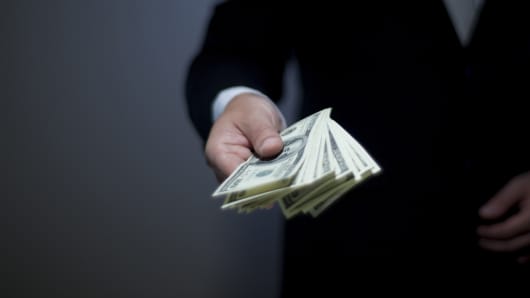Well Mom, that sounds like a fair deal," I replied, "but only if the CD is stashed in a Portuguese or Ukrainian bank! California banks offer between 0.1 and 1 percent for a 6-month deposit." Despite the paltry yield, I should point out that her local Wells Fargo branch does generously dispense lollipops and Purell gel to keep the kids and the adults happy and sanitized.
Read MoreTime to retire Social Security numbers?
Was this a scam? My mom is usually pretty savvy — and beautiful and young (She trained me well).
"What's the name of the bank, Mom?"
"Well, it's not really a bank. This guy called me, and I called him back because my neighbor is getting 4 percent on his CD."
Uh-oh.
"Some guy that your neighbor knows? Did he sound like that Nigerian grifter who sent you emails promising $50 million in a Prada duffle bag tucked into a locker at the Greyhound station in Lagos?"
After a few more queries, I dug my way to an answer, without ever having to buy an airline ticket to Lagos. The deal was not really a scam but a sort of "loss leader" for a financial advisor. We are all familiar with loss leaders in retail stores. Around Thanksgiving, your local supermarket may offer a Butterball Turkey at a bargain price, because the supermarket owners know that once they lure you into the store, you will stock up on sweet potatoes, cranberry sauce, wine, and other profitable items. Then you'll forget the pecan pie, and come back again.
Read MoreIf your appliances know you're not home—who else does?
In the non-food area, Hewlett-Packard sells us inkjet printers at measly prices. That's the loss leader. But once you buy that printer, you will be hooked on high-priced ink for a long time. Ink that costs more per ounce than just about any liquid, including 50 percent more than Chanel No. 5 perfume and twenty times the price of bubbly Dom Perignon. Imagine, if Chanel could just manage to squeeze some ink into their formula, we could save money printing documents and also smell more sultry.
Here's how my mother's 4-percent CD works as a loss leader: Some guy — let's call him Sunny — makes a deal with a legitimate FDIC-insured bank. The bank will pay a 1-percent annualized rate for a 6-month CD deposit from my mother. That means in exchange for a $10,000 deposit, the bank will pay $50. But Sunny now reaches into his pocket and forks over $150 to the cause. Therefore, my mom receives a total of $200, or a 4-percent annualized rate of return for the 6 months that she keeps her money in the bank.
Now, why would Sunny reach deep into his pocket to cough up the extra $150? Because $150 is a small price to pay for the privilege of spending time talking with my mother! And her friends, and all the other good people that Sunny might like to sell his financial services and products to. When the CD matures, Sunny will suggest more lucrative paths for the $10,200. I receive invitations from Morgan Stanley and Merrill Lynch financial advisors who offer to buy me a Ruth's Chris steak dinner in exchange for listening to their pitch. That ribeye and Bordeaux dinner costs more than Sunny's gift to my mother.
Read MoreRobin Williams' estate plan: Good, but not great
What warning sign should savers look for in CD pitches? First, like the old advertisements for Black Flag's Roach Motel ("Roaches check in, but they don't check out!"), speak with several friends who have successfully withdrawn their money once the loss-leader CD matures. These should be your real friends, not friends of Sunny. If you're the first in your neighborhood to receive the offer, quote Nancy Reagan and "Just say 'no.'"
Also, ask Sunny to write down the terms in simple English. He will likely offer you a shorter time frame than you expect — for instance, three months instead of six — and a skimpier yield than you'd heard about during the Pinochle game. Do not be pressured into signing any paper. Visit the bank to prove that your deposit would be FDIC-insured. Ask yourself whether saving a hundred dollars or so is worth this annoyance.
And, if you are the sort to act rashly, you might as well buy that early bird special airline ticket to Lagos. I hear there's a lot of money buried in a duffle bag.
Commentary by Todd G. Buchholz, a former White House economic advisor and managing director of the Tiger hedge fund. He is currently the CEO of Sproglit, which makes educational tools for children. He is also the author of "New Ideas from Dead CEOs and New Ideas from Dead Economists." Follow him on Twitter @Rushbook.


